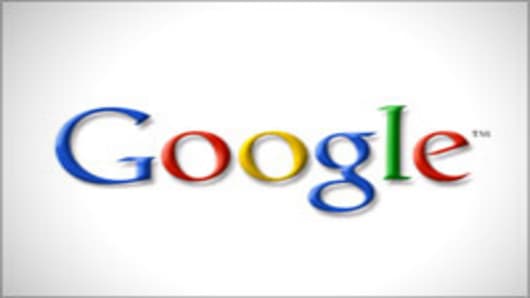Paid Click growth should be up between 13 and 16 percent; Web Sites gross revenue should decline between 13 and 15 percent; Web Site traffic acquisition costs should rise between 5.6 and 6 percent; Network Sites gross revenue should come in between $1.59 billion and $1.66 billion; Network Sites traffic acquisition costs should grow between 75 and 76 percent; North American and International revenue should each be flat to down 5 percent, though Mahaney suspects they'll be off 2 percent. He's looking for CapEx spending to come in between $300 million and $500 million, though less than $300 million would be a bullish sign.
All this and Citi reiterates its "buy" on the shares with a $580 target.
Others are not so positive. Benchmark's Clayton Moran doesn't believe an "advertising bottom has been reached yet," and will remain slow through the summer; ThinkEquity's William Morrison says "the path ahead could be a bumpy one."
Indeed, just this morning, we're starting to see the effects of Microsoft's $100 million marketing blitz for its new search engine Bing. ComScore says Google's Search market share remained flat in June at 65 percent; Yahoo's share fell slightly to 19.6 percent; but Bing rose fractionally, from 8 percent to 8.4 percent, making it the only search engine that actually grew share. Even slight gains in this climate can be considered significant.
Google and Microsoft has been going at it recently, and I've detailed the back-and-forth over the past few weeks. Both companies have had issues creating new, effective revenue streams.
But Microsoft has had infinitely more success and has been far more effective at doing so. I'm not saying investors ought to count out Google. That would be silly. But take into account Microsoft's track record, spotty though it might be, and its enormous cash position, and its new found aggressive marketing behavior -- not just with Google, but certainly Apple too, and I have to believe the odds favor Microsoft right now.
It's kind of like comparing Apple and Research in Motion : RIM is doing great with Blackberry but that's all it has. Apple's got iPhone, Mac, iPod, iTunes, The App Store, a great OS; huge and MULTIPLE revenue streams, making Apple a far more diversified and better bet.
Same goes with Google versus Microsoft. Google is still a one-hit wonder with Search. Microsoft has Windows, Office, Xbox, Bing, enterprise, consumer. Argue with quality; argue with track record. But you can't argue with dominance in MULTIPLE areas.
Also, as Google and Microsoft continue to go at each other, it seems easier for Microsoft to come up with an effective Search competitor and a web-based operating system than it would be for Google to come up with an effective operating system and bring it to the web, and try to penetrate the consumer and enterprise markets. The skill sets favor Microsoft. The infrastructure favors Microsoft. And so does the investment environment.
Google's earnings will be interesting, and set the tone for Yahoo next week. And as important as they are, Google's earnings Thursday will only be a small piece of an ever-changing, and increasingly intriguing competitive puzzle.
Questions? Comments? TechCheck@cnbc.com



